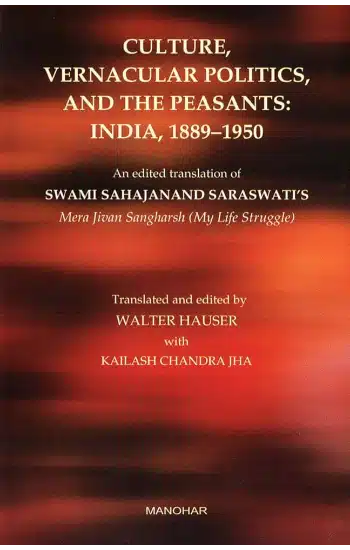
Save: 15%
Culture, Vernacular Politics, and the Peasants: India, 1889-1950: An Edited Translation of Swami Sahajanand`s Memoir
Publisher:
| Author:
| Language:
| Format:
Publisher:
Author:
Language:
Format:
₹2,295 ₹1,950
Save: 15%
In stock
Ships within:
In stock
| Book Type |
|---|
ISBN:
Page Extent:
India’s twentieth-century struggle for political freedom was and remains an epic achievement in the human experience. Quite apart from its global influence, this is perhaps as familiar a story as it is remarkable, given the legacy of Gandhi, among others of that small generation of founders, whose unique leadership roles are rightly considered to have been transformational in the achievement of freedom in 1947, and in the promulgation on the Constitution of January 195. But it must then also be said that the roles of the founding leadership were balanced and in many ways defined by the people of India themselves, primarily its peasants, whether the generic masses of Gandhi s definition and direction, or the Independent and self-aware peasants of the field. It is this broader peasant story, and particularly that of the deeply engaged peasants of the kisan andolan, the peasant movement of the late 192s and the 193s, that appears here in the words of Swami Sahajanand Saraswati. It was their shared experience, or as Sahajanand put it more pointedly and more accurately, their common struggle. In fact, Sahajanand and the peasants had lived this history, and the Swami recorded it for posterity in his 1952 Hindi memoir Mera Jivan Sangharsh (My Life Struggle), translated here for the first time by Walter Hauser and Kailash Jha.
India’s twentieth-century struggle for political freedom was and remains an epic achievement in the human experience. Quite apart from its global influence, this is perhaps as familiar a story as it is remarkable, given the legacy of Gandhi, among others of that small generation of founders, whose unique leadership roles are rightly considered to have been transformational in the achievement of freedom in 1947, and in the promulgation on the Constitution of January 195. But it must then also be said that the roles of the founding leadership were balanced and in many ways defined by the people of India themselves, primarily its peasants, whether the generic masses of Gandhi s definition and direction, or the Independent and self-aware peasants of the field. It is this broader peasant story, and particularly that of the deeply engaged peasants of the kisan andolan, the peasant movement of the late 192s and the 193s, that appears here in the words of Swami Sahajanand Saraswati. It was their shared experience, or as Sahajanand put it more pointedly and more accurately, their common struggle. In fact, Sahajanand and the peasants had lived this history, and the Swami recorded it for posterity in his 1952 Hindi memoir Mera Jivan Sangharsh (My Life Struggle), translated here for the first time by Walter Hauser and Kailash Jha.
About Author
Reviews
There are no reviews yet.
Related products
RELATED PRODUCTS
Harappan Studies: Recent Researches In South Asian Archaeology (Vol. I)
Save: 15%
Physics Set Of 2 Books: Vol.1 And Vol. 2
Save: 25%



Reviews
There are no reviews yet.